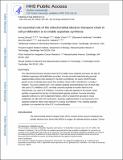An Essential Role of the Mitochondrial Electron Transport Chain in Cell Proliferation Is to Enable Aspartate Synthesis
Author(s)
Freinkman, Elizaveta; Wang, Tim; Chen, Walter W.; Abu-Remaileh, Monther; Sabatini, David; Birsoy, Kivanc; ... Show more Show less
DownloadSabatini_An essential role.pdf (2.530Mb)
PUBLISHER_CC
Publisher with Creative Commons License
Creative Commons Attribution
Terms of use
Metadata
Show full item recordAbstract
The mitochondrial electron transport chain (ETC) enables many metabolic processes, but why its inhibition suppresses cell proliferation is unclear. It is also not well understood why pyruvate supplementation allows cells lacking ETC function to proliferate. We used a CRISPR-based genetic screen to identify genes whose loss sensitizes human cells to phenformin, a complex I inhibitor. The screen yielded GOT1, the cytosolic aspartate aminotransferase, loss of which kills cells upon ETC inhibition. GOT1 normally consumes aspartate to transfer electrons into mitochondria, but, upon ETC inhibition, it reverses to generate aspartate in the cytosol, which partially compensates for the loss of mitochondrial aspartate synthesis. Pyruvate stimulates aspartate synthesis in a GOT1-dependent fashion, which is required for pyruvate to rescue proliferation of cells with ETC dysfunction. Aspartate supplementation or overexpression of an aspartate transporter allows cells without ETC activity to proliferate. Thus, enabling aspartate synthesis is an essential role of the ETC in cell proliferation.
Date issued
2015-07Department
Massachusetts Institute of Technology. Department of Biology; Whitehead Institute for Biomedical Research; Koch Institute for Integrative Cancer Research at MITJournal
Cell
Publisher
Elsevier
Citation
Birsoy, Kıvanç et al. “An Essential Role of the Mitochondrial Electron Transport Chain in Cell Proliferation Is to Enable Aspartate Synthesis.” Cell 162.3 (2015): 540–551.
Version: Author's final manuscript
ISSN
0092-8674
1097-4172